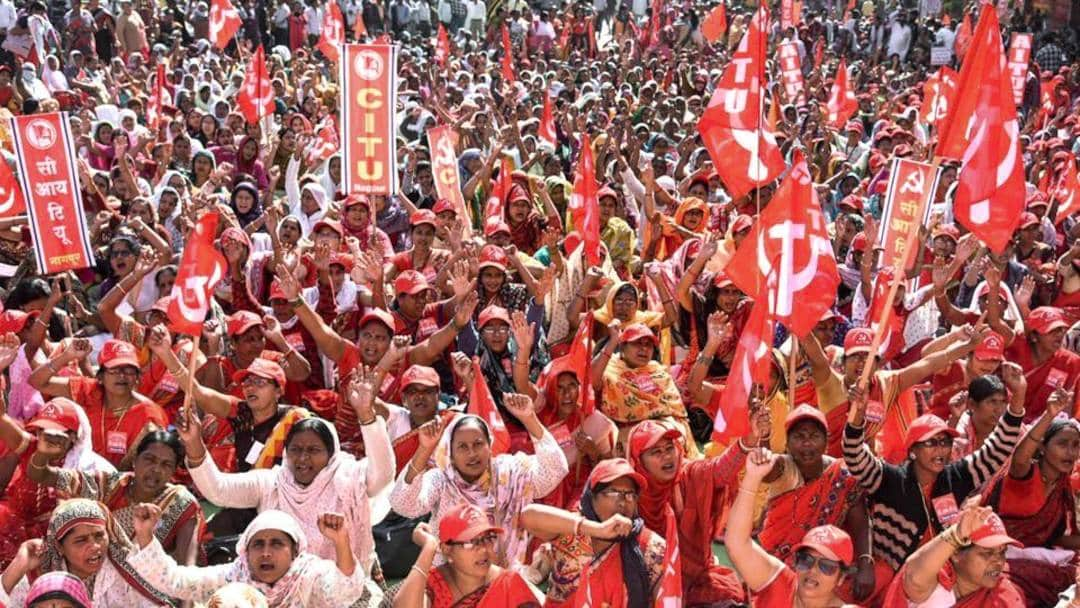The strike took place following months of protest from Indian farmers, a response to three farm acts passed by the Parliament of India in September 2020. According to protesters, the farm acts would leave small farmers, the vast majority, at the mercy of large corporations. Poor farmers were already desperate before the laws were passed - in 2019 alone, 10,281 agricultural workers committed suicide.
Dozens of farm unions began organizing protests demanding the repeal of these laws. After failing to get the support of their respective state governments, the farmers decided to pressure the Central Government by marching to Delhi en masse.
The farmers arrived at Delhi on November 25th, 2020 and were met by police, who employed the use of tear gas and water cannons, dug up roads, and used layers of barricades and sand barriers to try and stop their march.
On November 26th, 250 million workers from all over the country initiated a general strike in solidarity with the farmer's struggle. According to Tricontinental: Institute for Social Research, trade unions issued a twelve-point charter of demands which included "the reversal of the anti-worker, anti-farmer laws pushed by the government in September, the reversal of the privatisation of major government enterprises, and immediate [Covid] relief for the population".
Farmer protests continued for more than a year, featuring mass marches, clashes with police, and many failed negotiations between farmers' unions and the government. Rakesh Tikait, a leader with Bharatiya Kisan Union (English: Indian Farmers' Union) stated in October 2021 that approximately 750 participants have died in the protest.
Among the dead was a Senior Superintendent of Police in the city of Sonepat, who committed suicide, saying he could not bear the pain of the farmers. His suicide note read "Bullets fired from the guns kill only those whom they strike. The bullet of injustice, however, kills many with a single stroke... It is humiliating to suffer injustice."
In a televised address on November 19th, 2021, Indian Prime Minister Narendra Modi stated that his government would repeal the three acts in the upcoming winter parliamentary session in December. The national spokesperson of the Bharatiya Kisan Union, Rakesh Tikait, stated the protests would only cease once the laws were repealed.
The film actor Deep Sidhu also joined the protests, and was quoted as having told a police officer the following: "Ye inquilab hai. This is a revolution. If you take away farmers' land, then what do they have left? Only debt."
We Are Grass. We Grow on Everything: The Forty-Ninth Newsletter (2020).
Megathreads and spaces to hang out:
- ❤️ Come listen to music and Watch movies with your fellow Hexbears nerd, in Cy.tube
- 💖 Come talk in the New Weekly Queer thread
- 💛 Read and talk about a current topics in the News Megathread
- 💚 Come and talk in the Daily Bloomer Thread
- ⭐️ September Movie Nominations ⭐️
reminders:
- 💚 You nerds can join specific comms to see posts about all sorts of topics
- 💙 Hexbear’s algorithm prioritizes comments over upbears
- 💜 Sorting by new you nerd
- 🌈 If you ever want to make your own megathread, you can reserve a spot here nerd
- 🐶 Join the unofficial Hexbear-adjacent Mastodon instance toots.matapacos.dog
Links To Resources (Aid and Theory):
Aid:
Theory:


THE BOURGEOIS MIND
What does the word bourgeois actually mean?
It has remained unexplained, though it has been so much used and so often misapplied. Even when superficially used it is a word with a magic power of its own, and its depth has to be fathomed. The word designates a spiritual state, a direction of the soul, a peculiar consciousness of being. It is neither a social nor an economic condition, yet it is something more than a psychological and ethical one—it is spiritual, ontological. In the very depths of his being, or non-being, the bourgeois is distinguishable from the not-bourgeois; he is a man of a particular spirit, or particular soullessness. The state of being bourgeois has always existed in the world, and its immortal image is for ever fixed in the gospels with its equally immortal antithesis, but in the nineteenth century it attained its climax and ruled supreme.
Though the middle-class society of the last century is so spoken of in the superficial social-economic significance of the term, it is bourgeois in a deeper and more spiritual sense. This middle-class mentality ripened and enslaved human society and culture at the summit of their civilization. Its concupiscence is no longer restricted by man’s supernatural beliefs as it was in past epochs, it is no longer kept in bounds by the sacred symbolism of a nobler traditional culture; the bourgeois spirit emancipated itself, expanded, and was at last able to express its own type of life.
But even when the triumph of mediocrity was complete a few deep thinkers denounced it with uncompromising power: Carlyle, Nietzsche, Ibsen, Léon Bloy, Dostoievsky, Leontiev—all foresaw the victory of the bourgeois spirit over a truly great culture, on the ruins of which it would establish its own hideous kingdom.
With prophetic force and fire these men denounced the spiritual sources and foundations of middle-classdom and, repelled by its ugliness, thirsting for a nobler culture, a different life, looked back upon Greece or the middle ages, the Renaissance or Byzantium. Leontiev has stated the problem strikingly: